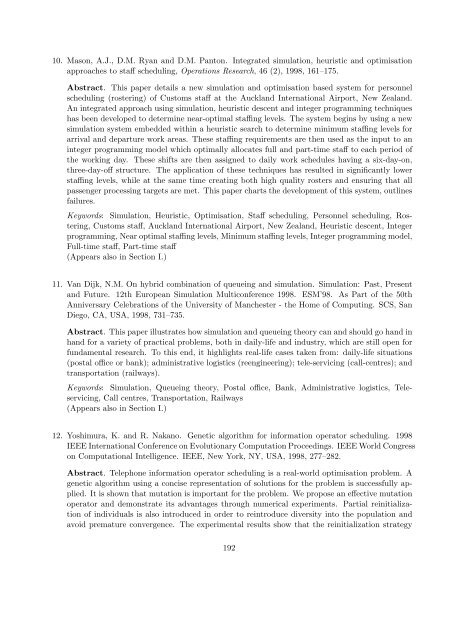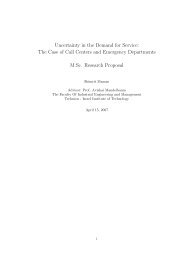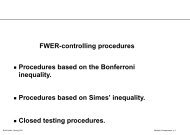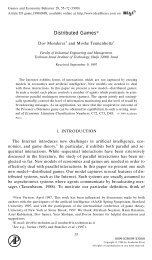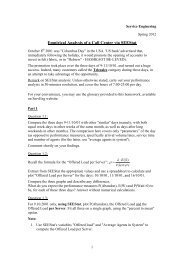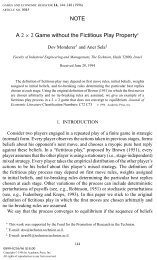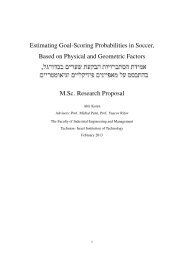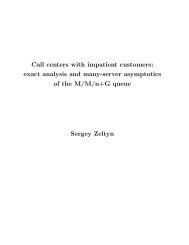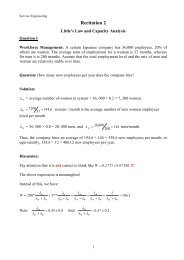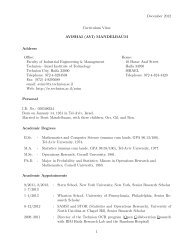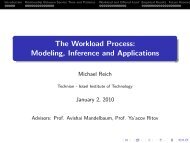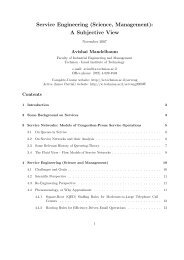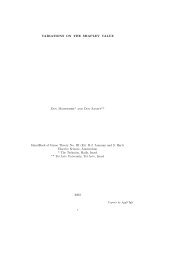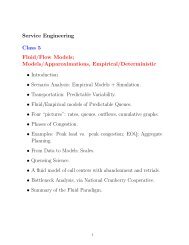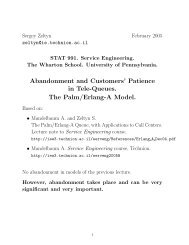CALL CENTERS (CENTRES) - Faculty of Industrial Engineering and ...
CALL CENTERS (CENTRES) - Faculty of Industrial Engineering and ...
CALL CENTERS (CENTRES) - Faculty of Industrial Engineering and ...
You also want an ePaper? Increase the reach of your titles
YUMPU automatically turns print PDFs into web optimized ePapers that Google loves.
10. Mason, A.J., D.M. Ryan <strong>and</strong> D.M. Panton. Integrated simulation, heuristic <strong>and</strong> optimisation<br />
approaches to staff scheduling, Operations Research, 46 (2), 1998, 161–175.<br />
Abstract. This paper details a new simulation <strong>and</strong> optimisation based system for personnel<br />
scheduling (rostering) <strong>of</strong> Customs staff at the Auckl<strong>and</strong> International Airport, New Zeal<strong>and</strong>.<br />
An integrated approach using simulation, heuristic descent <strong>and</strong> integer programming techniques<br />
has been developed to determine near-optimal staffing levels. The system begins by using a new<br />
simulation system embedded within a heuristic search to determine minimum staffing levels for<br />
arrival <strong>and</strong> departure work areas. These staffing requirements are then used as the input to an<br />
integer programming model which optimally allocates full <strong>and</strong> part-time staff to each period <strong>of</strong><br />
the working day. These shifts are then assigned to daily work schedules having a six-day-on,<br />
three-day-<strong>of</strong>f structure. The application <strong>of</strong> these techniques has resulted in significantly lower<br />
staffing levels, while at the same time creating both high quality rosters <strong>and</strong> ensuring that all<br />
passenger processing targets are met. This paper charts the development <strong>of</strong> this system, outlines<br />
failures.<br />
Keywords: Simulation, Heuristic, Optimisation, Staff scheduling, Personnel scheduling, Rostering,<br />
Customs staff, Auckl<strong>and</strong> International Airport, New Zeal<strong>and</strong>, Heuristic descent, Integer<br />
programming, Near optimal staffing levels, Minimum staffing levels, Integer programming model,<br />
Full-time staff, Part-time staff<br />
(Appears also in Section I.)<br />
11. Van Dijk, N.M. On hybrid combination <strong>of</strong> queueing <strong>and</strong> simulation. Simulation: Past, Present<br />
<strong>and</strong> Future. 12th European Simulation Multiconference 1998. ESM’98. As Part <strong>of</strong> the 50th<br />
Anniversary Celebrations <strong>of</strong> the University <strong>of</strong> Manchester - the Home <strong>of</strong> Computing. SCS, San<br />
Diego, CA, USA, 1998, 731–735.<br />
Abstract. This paper illustrates how simulation <strong>and</strong> queueing theory can <strong>and</strong> should go h<strong>and</strong> in<br />
h<strong>and</strong> for a variety <strong>of</strong> practical problems, both in daily-life <strong>and</strong> industry, which are still open for<br />
fundamental research. To this end, it highlights real-life cases taken from: daily-life situations<br />
(postal <strong>of</strong>fice or bank); administrative logistics (reengineering); tele-servicing (call-centres); <strong>and</strong><br />
transportation (railways).<br />
Keywords: Simulation, Queueing theory, Postal <strong>of</strong>fice, Bank, Administrative logistics, Teleservicing,<br />
Call centres, Transportation, Railways<br />
(Appears also in Section I.)<br />
12. Yoshimura, K. <strong>and</strong> R. Nakano. Genetic algorithm for information operator scheduling. 1998<br />
IEEE International Conference on Evolutionary Computation Proceedings. IEEE World Congress<br />
on Computational Intelligence. IEEE, New York, NY, USA, 1998, 277–282.<br />
Abstract. Telephone information operator scheduling is a real-world optimisation problem. A<br />
genetic algorithm using a concise representation <strong>of</strong> solutions for the problem is successfully applied.<br />
It is shown that mutation is important for the problem. We propose an effective mutation<br />
operator <strong>and</strong> demonstrate its advantages through numerical experiments. Partial reinitialization<br />
<strong>of</strong> individuals is also introduced in order to reintroduce diversity into the population <strong>and</strong><br />
avoid premature convergence. The experimental results show that the reinitialization strategy<br />
192


